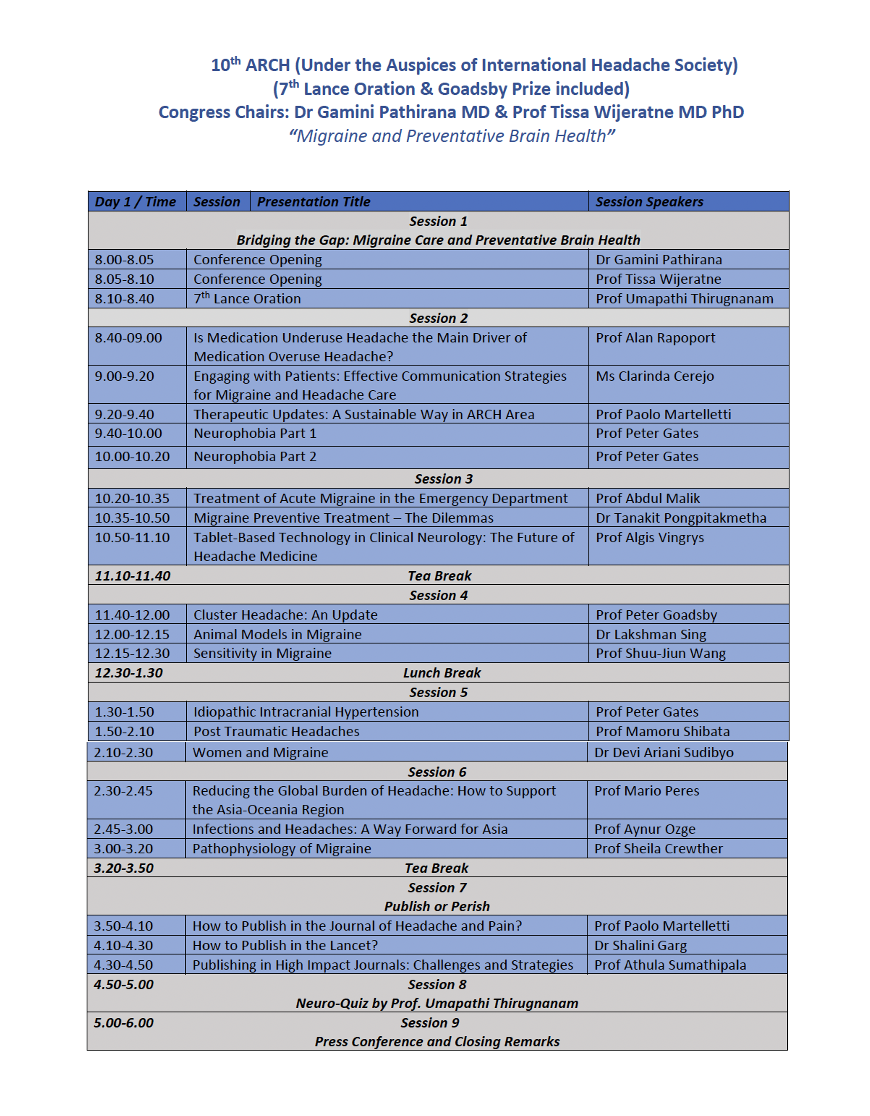Strengthening a Partnership
Published in Biomedical Research

The collaboration between the Asian Regional Consortium for Headache (ARCH) and The Journal of Headache and Pain is strengthened. The proceedings of the 10th ARCH Congress, 18-19 December 2024, Colombo, Sri Lanka, will be published as a Supplement to The Journal of Headache and Pain.
Following the publication of the Thematic Series Migraine and Brain Health: Towards Better Understanding from the Asia-Oceania Region this further step of collaboration will contribute to global migraine research while emphasizing the perspectives and needs of the Asia-Oceania community.

Follow the Topic
-
The Journal of Headache and Pain

The Journal of Headache and Pain is a peer-reviewed open access journal specifically dedicated to researchers involved in all aspects of headache and related pain syndromes, including epidemiology, public health, basic science, translational medicine, clinical trials and real-world data.
Related Collections
With Collections, you can get published faster and increase your visibility.
Focus Africa
The Journal of Headache and Pain is calling for submissions to our Collection on Focus Africa. Migraine is a major cause of disability worldwide, yet research efforts and healthcare strategies remain unevenly distributed across regions. In Africa, diverse populations and healthcare landscapes present unique challenges in the recognition, diagnosis, and management of migraine and other headache disorders. This thematic collection, Focus Africa, aims to enhance understanding of these conditions by exploring epidemiological trends, healthcare disparities, cultural influences, financial constraints, gender-related factors, and the availability of treatment options across the continent.
We invite submissions of original research, systematic and narrative reviews, editorials, rapid reviews, and commentaries on topics including, but not limited to:
• The prevalence, burden, and impact of migraine and other headache disorders across African countries
• Socio-economic and cultural determinants of headache disorders in Africa
• Insights into the pathophysiology of migraine from an African perspective
• Barriers to headache care, healthcare inequalities, and policy solutions
This Collection provides a dedicated platform for African researchers and clinicians to contribute to global headache science while addressing the specific needs of the region. By fostering collaboration and knowledge exchange, Focus Africa aims to drive meaningful advancements in migraine and headache disorders research and care across the continent.
Therefore, the collection welcomes researchers from author groups all with their main affiliated institution in Africa. Cross-continental authorship groups are welcome to submit their work to The Journal of Headache and Pain outside of this collection.
Springer Nature offers article processing charges (APC) waivers and discounts for articles published in our fully open access journals whose corresponding authors are based in the world’s lowest income countries (see our APC waivers and discounts policy for further information). Requests for APC waivers and discounts from other authors will be considered on a case-by-case basis and may be granted in cases of financial need (see our open access policies for journals for more information). All applications for discretionary APC waivers and discounts should be made at the point of manuscript submission; requests made during the review process or after acceptance are unable to be considered. Should applications for financial support via the above process be unsuccessful, authors are encouraged to reach out to the journal.
Publishing Model: Open Access
Deadline: Mar 20, 2026
Pathophysiology of Pain in Neurodegenerative Diseases
Pain is a debilitating and often under-recognized symptom of neurodegenerative disorders (NDD), including but not limited to Alzheimer's disease (AD) and Parkinson's disease (PD). One of the interesting and clinically relevant issues is the bidirectional relationship between pain and NDD. In particular, NDD, like chronic pain, which involves not only peripheral but also central mechanisms, is often associated with neuroinflammation, central and peripheral sensitization, and neuronal degeneration. Such chronic pain may worsen the neurodegenerative process, while acute pain may be overlooked in AD and other conditions associated with cognitive decline. The underlying common and disease-specific molecular mechanisms, likely involving changes in neurotransmitters, ion channels, and glial activation, remain largely unknown. It is not entirely clear whether and how the neurodegenerative process may serve as a cause of pain, creating a vicious circle that significantly affects the quality of life of patients. Headaches, and migraine in particular, may have their own specific interactions with NDD. These unanswered questions require research that should deepen our understanding of the molecular and cellular mechanisms of such connections, exploring how these discoveries may inspire the development of targeted therapeutic strategies to improve patient outcomes.
The current Thematic Series “Pathophysiology of Pain in Neurodegenerative Diseases” invites original papers and review articles primarily devoted to understanding pathophysiological mechanisms linking various types of pain, including migraine, headache and other pain syndromes, with neurodegenerative disorders. This series aims to advance our understanding of these complex associations to promote future research for innovative therapeutic strategies.
This Collection supports and amplifies research related to SDG 3, Good Health and Well-Being.
All submissions in this collection undergo the journal’s standard peer review process. Similarly, all manuscripts authored by a Guest Editor(s) will be handled by the Editor-in-Chief. As an open access publication, this journal levies an article processing fee (details here). We recognize that many key stakeholders may not have access to such resources and are committed to supporting participation in this issue wherever resources are a barrier. For more information about what support may be available, please visit OA funding and support, or email OAfundingpolicy@springernature.com or the Editor-in-Chief.
Publishing Model: Open Access
Deadline: Mar 16, 2026





Please sign in or register for FREE
If you are a registered user on Research Communities by Springer Nature, please sign in